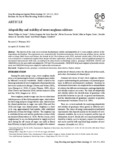Por favor, use este identificador para citar o enlazar este ítem:
http://www.alice.cnptia.embrapa.br/alice/handle/doc/965959| Título: | Adaptability and stability of sweet sorghum cultivars. |
| Autor: | SOUZA, V. F. de  PARRELLA, R. A. da C.   TARDIN, F. D.   COSTA, M. R.   CARVALHO JUNIOR, G. A. de   SCHAFFERT, R. E.   |
| Afiliación: | VANDER FILLIPE DE SOUZA, BOLSISTA; RAFAEL AUGUSTO DA COSTA PARRELLA, CNPMS; FLAVIO DESSAUNE TARDIN, CNPMS; ROBERT EUGENE SCHAFFERT, CNPMS. |
| Año: | 2013 |
| Referencia: | Crop Breeding and Applied Biotechnology, Londrina, v. 13, p. 144-151, 2013. |
| Descripción: | The objective of this study was to evaluate the phenotypic stability and adaptability of 25 sweet sorghum cultivars of Embrapa Maize and Sorghum. The experiments were conducted in five Brazilian environments, three in the state of Minas Gerais, and the others in Sinop, Mato Grosso and Pelotas, Rio Grande do Sul. Fresh biomass yield (FBY), and total soluble solids (TSS) of the juice were evaluated in a randomized complete block design with three replications. Analysis of variance showed significant genotype by environment interaction for both traits. According to the Annicchiarico methodology analysis, genotypes CMSXS634, BRS506, and CMSXS646 were the most stable and adapted for FBY and TSS concomitantly; CMSXS634 being more adapted to favorable environments and CMSXS646 being more adapted to unfavorable environments. |
| Thesagro: | Sorgo Sorghum bicolor Biocombustível Etanol |
| Tipo de Material: | Artigo de periódico |
| Acceso: | openAccess |
| Aparece en las colecciones: | Artigo em periódico indexado (CNPMS)  |
Ficheros en este ítem:
| Fichero | Descripción | Tamaño | Formato | |
|---|---|---|---|---|
| Adaptabilitystability1.pdf | 409 kB | Adobe PDF |  Visualizar/Abrir |









